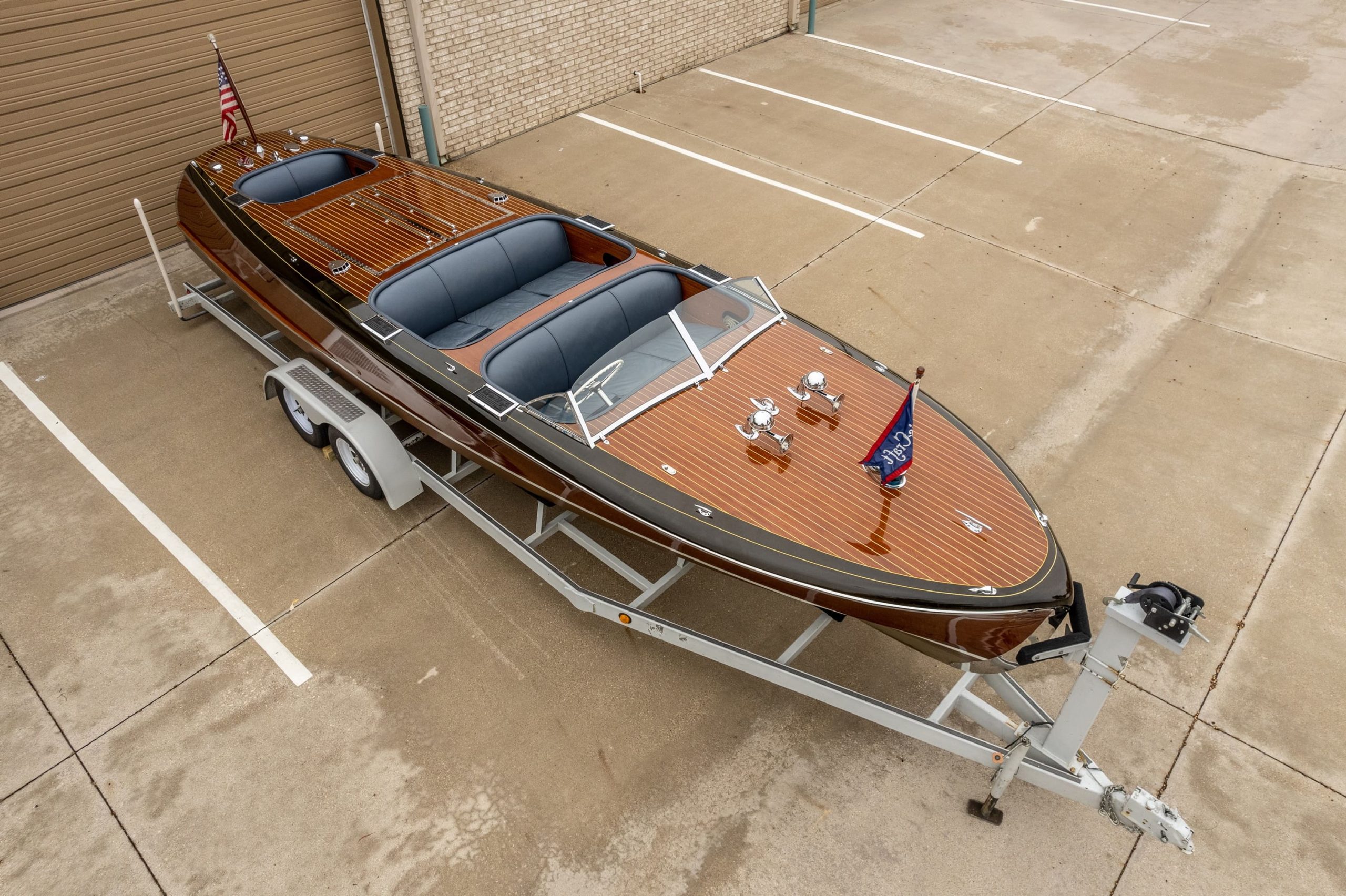Wrigley Gum Heir’s Porsche and a Pristine Ferrari Spyder to Highlight Miami Car Auction
An exceptionally rare 1967 Ferrari 365 California Spyder by Pininfarina, the ninth of just 14 built, will highlight an auction of classic cars and other vehicles in Miami next month.
RM Sotheby’s will conduct a two-day auction from March 1-2 with 119 motor vehicle lots at the first ModaMiami extravaganza. On offer will be boats, motorcycles, and a plane, too.
The Spyder is in exceptionally original condition, with certification from Ferrari Classiche that it retains its matching-numbers chassis, engine, transmission, rear axle, and body. The car is chassis number 9935, completed in May 1967 and in the hands of two long-term owners (four owners total). It was specified with China Red paint and a white-leather interior that matched the Los Angeles-based first owner Nancy Tewksbury’s 275 GTS. The coach-built car was bought by Donald Grove, a Princeton physicist, in 1971. Grove restored the car and kept it for 27 years. The Spyder is estimated to achieve between US$4 million and US$4.5 million.

RM Sotheby’s
Another notable car at the auction will be a 1929 Duesenberg Model J “Sweep Panel” dual-cowl phaeton with coachwork by LeBaron. The car’s original owner was Phillip K. Wrigley, who took over the famous chewing gum company (and the Chicago Cubs) from his father, William Wrigley, Jr. The younger Wrigley traveled to the Duesenberg factory in Indiana to see his car being built. It is chassis 2177 with engine J-121, originally with a Murphy body.
After a year and 10,400 miles, Wrigley decided he preferred the dual-cowl LeBaron phaeton body on a friend’s car better, and so he retained his original chassis but swapped on the LeBaron body. It was the kind of thing that was possible on cars with body-on-frame construction. The Duesenberg is estimated to achieve between US$2.65 million and US$2.85 million.

RM Sotheby’s
From the racing side of things comes a 1966 Porsche 906 Carrera S with competition history, initially driven by first owner Josef “Sepp” Greger. The car ran to victory in the two-litre class at the European Hillclimb Championship in 1966 and the European Mountain Championship in 1968. Under new owners, it competed in other German races in 1971 and 1972, then went to Macau, where it also raced but did not finish. It took part in some 80 races (achieving more class wins than any other 906) and was even used briefly as a road car. Under New York owner Jean Goutal, who bought the car in 2003, it was finally fully restored by Porsche racing specialist Kevin Jeanette’s Gunnar Racing. After three years of work, the Carrera is now virtually as-delivered, with many period details. The estimate is between US$1.8 million and US$2.8 million.

RM Sotheby’s
Other special cars in the RM Sotheby’s Miami auction include:
— The 1964 289-powered Mark II AC Cobra is a late production model with rack-and-pinion steering and a pair of dual-barrel carburetors from the factory. The car retains its original engine, which offers 271 horsepower. Originally sold in Illinois and then Ohio, the car was on the cover of the first Cobra World Registry in 1974. The Cobra was repainted in the 1980s in its current classic blue with white stripes. After extensive service in 2022 by Cobra specialist Rare Drive in New Hampshire (including a rebuild of the brakes and suspension) it is ready for the road. The car has never been in an accident or had extensive modifications. It’s estimated at US$1.1 million to US$1.3 million.
— The 1929 De Havilland DH60GM Gipsy Moth is a restored airplane from the early days of aviation that was used in the making of the 1985 hit film Out of Africa. In keeping with that history, the plane’s sale benefits a rhinoceros sanctuary in Kenya. This all-metal Gipsy Moth was built under a De Havilland license in the U.S. in 1929. It was then shipped to the UK, where it was eventually registered G-AAMY to celebrate the career of British aviatrix Amy Johnson, the first woman to fly solo from England to Australia in her own Gipsy Moth. In 1985, the plane was dismantled and shipped in two crates to Nairobi by way of Germany. It subsequently appeared in numerous scenes in Out of Africa , which starred Meryl Streep and Robert Redford and is based on the 1937 autobiography of that name by Isak Dinesen (a pseudonym for Karen Blixen). The plane has been regularly maintained and now has an uprated De Havilland Gypsy II engine that makes 135 horsepower, and is said to be eminently air-worthy. The plane is projected to bring US$140,000 to US$220,000.

RM Sotheby’s
— The 27-foot 1941 Chris-Craft Model 115 Custom Runabout “Runaway Jane” is the only survivor of three of these triple-cockpit wooden boats built that year. It was restored by Michigan experts in 2002 and has been sympathetically maintained since then. Power now comes from an 8.2-liter Mercruiser V8 with more than 300 horsepower, considerably enlivening the original performance. Only 62 examples of this 27-foot craft were built over a 10-year period.The low estimate is US$175,000 and the high US$225,000.

RM Sotheby’s
There are, of course, many other vehicles being sold, including a series of BMW M cars, and classic Mercedes, including examples of the 540K, the 770K, and the 300SL.
 Copyright 2020, Dow Jones & Company, Inc. All Rights Reserved Worldwide. LEARN MORE
Copyright 2020, Dow Jones & Company, Inc. All Rights Reserved Worldwide. LEARN MORE
This stylish family home combines a classic palette and finishes with a flexible floorplan
Just 55 minutes from Sydney, make this your creative getaway located in the majestic Hawkesbury region.
Impact investing is becoming more mainstream as larger, institutional asset owners drive more money into the sector, according to the nonprofit Global Impact Investing Network in New York.
In the GIIN’s State of the Market 2024 report, published late last month, researchers found that assets allocated to impact-investing strategies by repeat survey responders grew by a compound annual growth rate (CAGR) of 14% over the last five years.
These 71 responders to both the 2019 and 2024 surveys saw their total impact assets under management grow to US$249 billion this year from US$129 billion five years ago.
Medium- and large-size investors were largely responsible for the strong impact returns: Medium-size investors posted a median CAGR of 11% a year over the five-year period, and large-size investors posted a median CAGR of 14% a year.
Interestingly, the CAGR of assets held by small investors dropped by a median of 14% a year.
“When we drill down behind the compound annual growth of the assets that are being allocated to impact investing, it’s largely those larger investors that are actually driving it,” says Dean Hand, the GIIN’s chief research officer.
Overall, the GIIN surveyed 305 investors with a combined US$490 billion under management from 39 countries. Nearly three-quarters of the responders were investment managers, while 10% were foundations, and 3% were family offices. Development finance institutions, institutional asset owners, and companies represented most of the rest.
The majority of impact strategies are executed through private-equity, but public debt and equity have been the fastest-growing asset classes over the past five years, the report said. Public debt is growing at a CAGR of 32%, and public equity is growing at a CAGR of 19%. That compares to a CAGR of 17% for private equity and 7% for private debt.
According to the GIIN, the rise in public impact assets is being driven by larger investors, likely institutions.
Private equity has traditionally served as an ideal way to execute impact strategies, as it allows investors to select vehicles specifically designed to create a positive social or environmental impact by, for example, providing loans to smallholder farmers in Africa or by supporting fledging renewable energy technologies.
Future Returns: Preqin expects managers to rely on family offices, private banks, and individual investors for growth in the next six years
But today, institutional investors are looking across their portfolios—encompassing both private and public assets—to achieve their impact goals.
“Institutional asset owners are saying, ‘In the interests of our ultimate beneficiaries, we probably need to start driving these strategies across our assets,’” Hand says. Instead of carving out a dedicated impact strategy, these investors are taking “a holistic portfolio approach.”
An institutional manager may want to address issues such as climate change, healthcare costs, and local economic growth so it can support a better quality of life for its beneficiaries.
To achieve these goals, the manager could invest across a range of private debt, private equity, and real estate.
But the public markets offer opportunities, too. Using public debt, a manager could, for example, invest in green bonds, regional bank bonds, or healthcare social bonds. In public equity, it could invest in green-power storage technologies, minority-focused real-estate trusts, and in pharmaceutical and medical-care company stocks with the aim of influencing them to lower the costs of care, according to an example the GIIN lays out in a separate report on institutional strategies.
Influencing companies to act in the best interests of society and the environment is increasingly being done through such shareholder advocacy, either directly through ownership in individual stocks or through fund vehicles.
“They’re trying to move their portfolio companies to actually solving some of the challenges that exist,” Hand says.
Although the rate of growth in public strategies for impact is brisk, among survey respondents investments in public debt totaled only 12% of assets and just 7% in public equity. Private equity, however, grabs 43% of these investors’ assets.
Within private equity, Hand also discerns more evidence of maturity in the impact sector. That’s because more impact-oriented asset owners invest in mature and growth-stage companies, which are favored by larger asset owners that have more substantial assets to put to work.
The GIIN State of the Market report also found that impact asset owners are largely happy with both the financial performance and impact results of their holdings.
About three-quarters of those surveyed were seeking risk-adjusted, market-rate returns, although foundations were an exception as 68% sought below-market returns, the report said. Overall, 86% reported their investments were performing in line or above their expectations—even when their targets were not met—and 90% said the same for their impact returns.
Private-equity posted the strongest results, returning 17% on average, although that was less than the 19% targeted return. By contrast, public equity returned 11%, above a 10% target.
The fact some asset classes over performed and others underperformed, shows that “normal economic forces are at play in the market,” Hand says.
Although investors are satisfied with their impact performance, they are still dealing with a fragmented approach for measuring it, the report said. “Despite this, over two-thirds of investors are incorporating impact criteria into their investment governance documents, signalling a significant shift toward formalising impact considerations in decision-making processes,” it said.
Also, more investors are getting third-party verification of their results, which strengthens their accountability in the market.
“The satisfaction with performance is nice to see,” Hand says. “But we do need to see more about what’s happening in terms of investors being able to actually track both the impact performance in real terms as well as the financial performance in real terms.”
This stylish family home combines a classic palette and finishes with a flexible floorplan
Just 55 minutes from Sydney, make this your creative getaway located in the majestic Hawkesbury region.






















